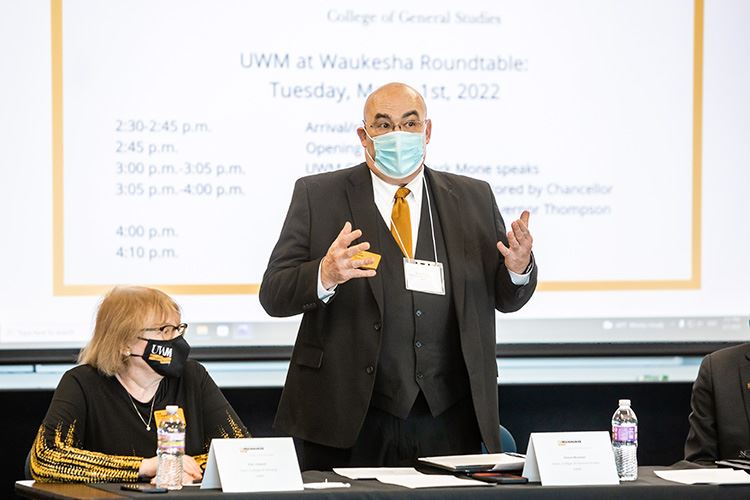
Expanding public transit options could bring more students from around southeastern Wisconsin to UWM at Waukesha while connecting those already on campus to more work opportunities, some regional business and educational leaders told UW System President Tommy Thompson.
Southeastern Wisconsin lacks a transportation system that connects people across municipal lines, especially the population hubs of Milwaukee and Waukesha. Robyn Ludtke, vice president of talent development at the Waukesha County Business Alliance, said at a roundtable discussion led by Thompson that transportation is one of the biggest barriers of growth for the county.
It was the latest in a series of listening sessions that Thompson is holding at UW System campuses across the state as he winds down a nearly two-year-long tenure as interim president.
“What I really want to hear is ‘What is the need? How can the university solve problems?’” Thompson said Tuesday at the UWM at Waukesha gathering.
Ludtke and a few others among the roughly 30 attendees cited transportation as one of the biggest needs.
“We know that once (the students) are here in Waukesha County, our employers are ready to serve them. Our communities are ready to welcome them,” Ludtke said. “How do we get them here?”
While UWM and other system institutions may not have oversight or capacity to create regional transportation networks, universities can help by way of research and forging partnerships.
One example is the FlexRide Milwaukee transit project, led in part by UWM, that is funded by a $1 million grant from the National Science Foundation. FlexRide is testing a new way to connect workers from Milwaukee, including three segregated neighborhoods on the north or northwest sides of the city, to places of employment in Butler and Menomonee Falls.
Other roundtable attendees included company executives and school district superintendents, some of whom talked about finding ways to increase awareness of higher education to students in high school and even earlier in the K-12 system.
While virtual outreach and mailings help, some school officials talked about the importance of opportunities to bring K-12 students to college campuses for programming.
“I do think we need to reimagine that transition in a kid’s life from 10th grade through college,” said Corey Golla, superintendent of the Menomonee Falls School District. “We’ve got kids who are seniors in high school who are probably ready to be freshmen at UW-Milwaukee.”
Golla applauded UWM for its partnership programs and said his district was talking to the university about more potential dual enrollment opportunities in which students earn college credit while still attending high school.
UWM Chancellor Mark Mone said he hoped to organize a meeting between university leaders and superintendents in Waukesha and Washington counties to talk more about partnership opportunities. One of the higher-profile educational partnerships at UWM is the M³ initiative in which the university works with Milwaukee Public Schools and Milwaukee Area Technical College.
Other needs brought up by attendees included making it easier for students at two-year colleges to transfer credits to four-year institutions, and for UWM to offer more options for “badges” or credentialing programs that allow students, including those in mid-career, to earn educational certificates.
Mone noted how the university was currently looking at curricular realignment through the 2030 initiative, which is intended to guide UWM into the next decade and beyond. Participation in partnerships like M³ and the Higher Education Regional Alliance also are helping to address issues like making it easier for students to transfer credits.
Another UWM program, TechEd Frontiers, is an example of an offering for mid-career professionals to learn new skills online and on demand. UWM has also helped to address a regional need with the College of Nursing expanding its program to the Waukesha campus in fall 2021.
Higher education overall has come under scrutiny in recent years over rising costs and the weight of student debt. Estimated enrollment declines caused by shifting demographics, as well as a steady decrease in state support, also are among worrisome issues.
Thompson pointed to the importance of community feedback to help address concerns.
“It seems to me this whole afternoon has been about how we can do things better working together – more information, more collaboration and more partnerships,” Thompson said in closing the session.
“I think the university has to take the lead on this,” he added. “We have to be student-centric. We have to make sure our universities are what students need and want. We have to get them on our campus. We have to go to them. We have to create partnerships.”
https://uwm.edu/news/transit-partnerships-are-among-community-needs-voiced-at-waukesha-roundtable/